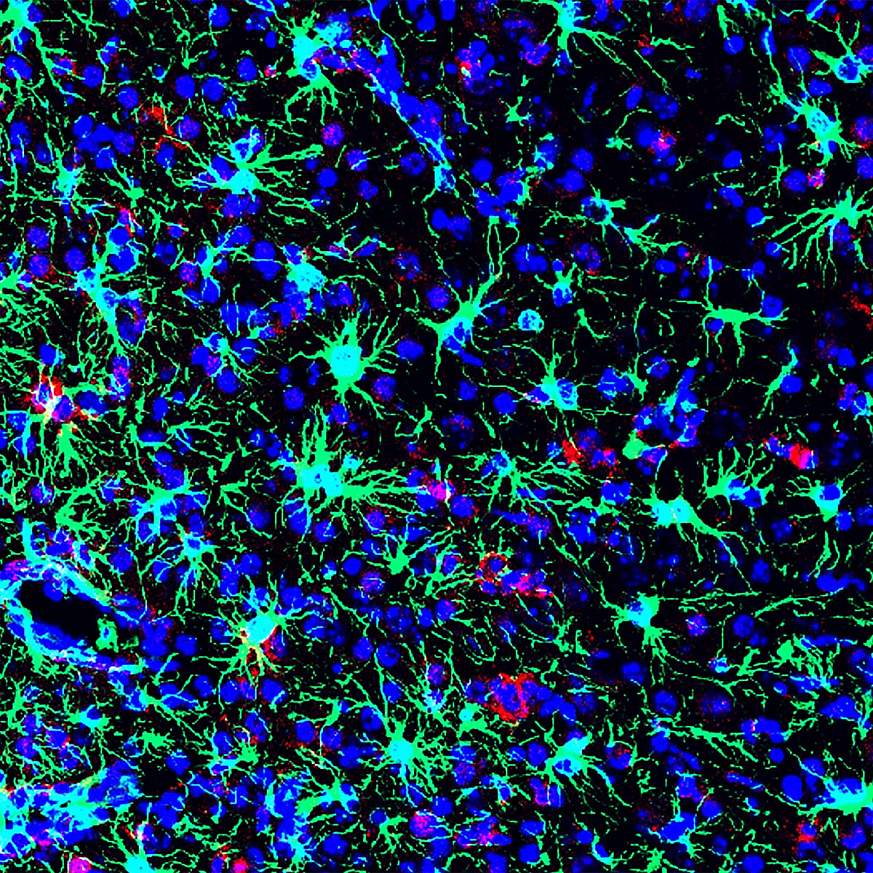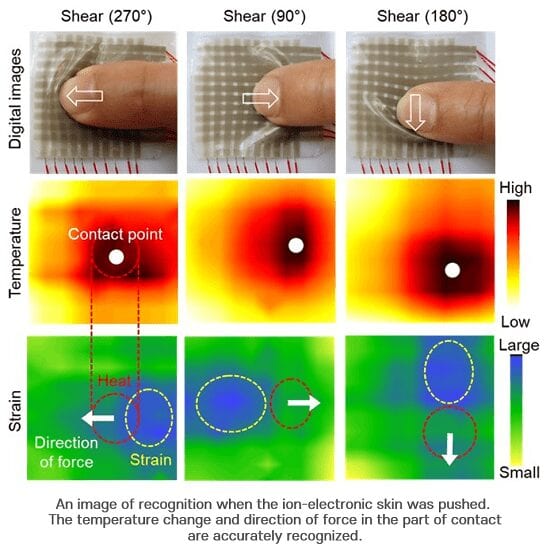
Combating Zika
In a preclinical study, NIH scientists found that the commonly used antibiotic methacycline may be effective at combating the neurological problems caused by Zika virus infections. Here is a picture of a Zika-infected mouse brain from the study. Courtesy of Nath lab NIH/NINDS.
Commonly used antibiotic shows promise for combating Zika infections
In 2015, hundreds of children were born with brain deformities resulting from a global outbreak of Zika virus infections. Recently, National Institutes of Health researchers used a variety of advanced drug screening techniques to test out more than 10,000 compounds in search of a cure. To their surprise, they found that the widely used antibiotic methacycline was effective at preventing brain infections and reducing neurological problems associated with the virus in mice. In addition, they found that drugs originally designed to combat Alzheimer’s disease and inflammation may also help fight infections.
“Around the world, the Zika outbreak produced devastating, long-term neurological problems for many children and their families. Although the infections are down, the threat remains,” said Avindra Nath, M.D., senior investigator at the NIH’s National Institute of Neurological Disorders and Stroke (NINDS) and a senior author of the study published in PNAS. “We hope these promising results are a good first step to preparing the world for combating the next potential outbreak.”
The study was a collaboration between scientists on Dr. Nath’s team and researchers in laboratories led by Anton Simeonov, Ph.D., scientific director at the NIH’s National Center for Advancing Translational Sciences (NCATS) and Radhakrishnan Padmanabhan, Ph.D., Professor of Microbiology & Immunology, Georgetown University Medical Center, Washington, D.C.
The Zika virus is primarily spread by the Aedes aegypti mosquito. In 2015 and 2016, at least 60 countries reported infections. Some of these countries also reported a high incidence of infected mothers giving birth to babies born with abnormally small heads resulting from a developmental brain disorder called fetal microcephaly. In some adults, infections were the cause of several neurological disorders including Guillain-Barré syndrome, encephalitis, and myelitis. Although many scientists have tried, they have yet to discover an effective treatment or vaccination against the virus.
In this study, the researchers looked for drugs that prevent the virus from reproducing by blocking the activity of a protein called NS2B-NS3 Zika virus protease. The Zika virus is a protein capsule that carries long strings of RNA-encoded instructions for manufacturing more viral proteins. During an infection, the virus injects the RNA into a cell, resulting in the production of these proteins, which are strung together, side-by-side, like the parts in a plastic model airplane kit. The NS2B-NS3 protease then snaps off each protein, all of which are critical for assembling new viral particles.
“Proteases act like scissors. Blocking protease activity is an effective strategy for counteracting many viruses,” said Rachel Abrams, Ph.D., an organic chemist in Dr. Nath’s lab and the study leader. “We wanted to look as far and wide as possible for drugs that could prevent the protease from snipping the Zika virus polyprotein into its active pieces.”
To find candidates, Dr. Abrams worked with scientists on Dr. Simeonov’s and Dr. Padmanabhan’s teams to create assays, or tests, for assessing the ability of drugs to block NS2B-NS3 Zika virus protease activity in plates containing hundreds of tiny test tubes. Each assay was tailored to a different screening, or sifting, technique. They then used these assays to simultaneously try out thousands of candidates stored in three separate libraries.
One preliminary screen of 2,000 compounds suggested that commonly used, tetracycline-based antibiotic drugs, like methacycline, may be effective at blocking the protease.
Meanwhile, a large-scale screen of more than 10,000 compounds helped identify an investigational anti-inflammatory medicine, called MK-591, and a failed anti-Alzheimer’s disease drug, called JNJ-404 as potential candidates. A virtual screen of over 130,000 compounds was also used to help spot candidates. For this, the researchers fed the other screening results into a computer and then used artificial intelligence-based programs to learn what makes a compound good at blocking NS2B-NS3 Zika virus protease activity.
“These results show that taking advantage of the latest technological advances can help researchers find treatments that can be repurposed to fight other diseases,” said Dr. Simeonov.
The Zika virus is known to preferentially infect stem cells in the brain. Scientists suspect this is the reason why infections cause more harm to newborn babies than to adults. Experiments on neural stem cells grown in petri dishes indicated that all three drugs identified in this study may counteract these problems. Treating the cells with methacycline, MK-591, or JNJ-404 reduced Zika virus infections.
Because tetracyclines are U.S. Food and Drug Administration-approved drugs that are known to cross the placenta of pregnant women, the researchers focused on methacycline and found that it may reduce some neurodevelopmental problems caused by the Zika virus. For instance, Zika-infected newborn mice that were treated with methacycline had better balance and could turn over more easily than ones that were given a placebo. Brain examinations suggested this was because the antibiotic reduced infections and neural damage. Nevertheless, the antibiotics did not completely counteract harm caused by the Zika virus. The weight of mice infected with the virus was lower than control mice regardless of whether the mice were treated with methacycline.
“These results suggest that tetracycline-based antibiotics may at least be effective at preventing the neurological problems associated with Zika virus infections,” said Dr. Abrams. “Given that they are widely used, we hope that we can rapidly test their potential in clinical trials.”
The Latest Updates from Bing News & Google News
Go deeper with Bing News on:
Zika infections
- Enhancing Health Communication for Epidemic Prevention
Effective public health communication is essential for Africa, confronted with numerous infectious disease epidemics and public health crises.
- Improving public health communication in African epidemics: Lessons learned and future directions
Zika and other public health emergencies, effective communication of public health messages is crucial to control the spread of disease, maintain public trust, and encourage compliance with health ...
- Dengue Fever
Dengue fever is a viral infection that Aedes mosquitoes spread to humans. Symptoms include a high fever and body aches. Cases do happen in the U.S.
- Why malaria is on the rise – and how to protect yourself on holiday
Returning from a tropical holiday should come with a suntan and sense of relaxation – not a tropical disease. However, the number of British travellers catching malaria abroad is rising, and ...
- Mosquito-Borne Diseases To See 'Increasingly Frequent Outbreaks' Worldwide
"We must anticipate outbreaks and move to intervene early to prevent diseases from happening in the first place," researchers warn.
Go deeper with Google Headlines on:
Zika infections
[google_news title=”” keyword=”Zika infections” num_posts=”5″ blurb_length=”0″ show_thumb=”left”]
Go deeper with Bing News on:
Zika
- Enhancing Health Communication for Epidemic Prevention
Effective public health communication is essential for Africa, confronted with numerous infectious disease epidemics and public health crises.
- Improving public health communication in African epidemics: Lessons learned and future directions
Zika and other public health emergencies, effective communication of public health messages is crucial to control the spread of disease, maintain public trust, and encourage compliance with health ...
- New type of host defence against Zika, dengue infections revealed
Research explains why some viruses present in bodily fluids don't spread through those fluids, revealing a novel defense mechanism against viral infection.
- DNA vaccine against Zika performs well in tests on mice
In Brazil, researchers at the University of São Paulo (USP) and the Pernambuco division of Oswaldo Cruz Foundation (FIOCRUZ) are developing a Zika vaccine. The formulation was tested on mice and found ...
- DNA vaccine against zika performs well in tests on mice
In Brazil, researchers at the University of São Paulo (USP) and the Pernambuco division of Oswaldo Cruz Foundation (FIOCRUZ) are developing a zika vaccine. The formulation was tested on mice and ...
Go deeper with Google Headlines on:
Zika
[google_news title=”” keyword=”Zika” num_posts=”5″ blurb_length=”0″ show_thumb=”left”]










